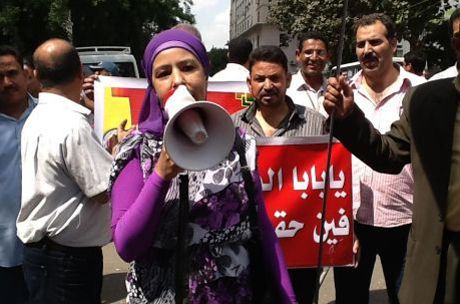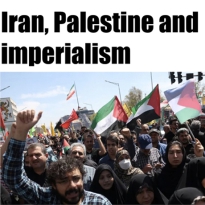News
You are here
Class struggle in Egypt swells after the Revolution

May 14, 2013
It has been two years since the eruption of the Egyptian revolution in 2011 that shook the country and the world. The people demanded common things like social justice, democracy and freedom of speech. Two years later, it’s important to look back and see what has changed, what has been achieved so far?
Social injustice moved people into Tahrir Square. They protested police brutality and corruption and the regime of Hosni Mubarak which had presided over severe inequality. The gap between the rich and the poor was getting bigger year after another, with the high class getting richer and richer while the lower class struggled for survival. Around 40 percent of the population lived under the poverty line; that is how bad the situation was.
After the toppling of Mubarak and elections which brought the Muslim Brotherhood to power, the economy continues to go downhill. The new government, relying on loans from the International Monetary Fund (IMF), has put increasing the living standards of the majority of Egyptians at the bottom of its list of priorities. One would think that improving the livelihood of those who were struggling for a long time to make a living, and started a revolution over it, would be valued more highly, but the government has chosen to inflate prices on basic products and services, in an attempt to “fix” the economy, instead of raising taxes and prices of luxury/leisurely products and services. Prices of food, smoke, soft drinks and gas are sky-rocketing.
The government’s insensitivity to the struggle of the already –diminishing middle class and the already-suffering lower class has created more anger in the streets, and disappointment in the way the revolution has turned out. That anger has resulted in strikes and protests in different sectors. This is driving a wedge between the leadership of the Muslim Brotherhood that wants to preserve the rule of the 1%, and the party's base that includes many poor and working class people and activists.
The strike of rail workers has been one of the biggest so far, starting around the beginning of April. The military, which controls large parts of the Egyptian economy, has offeried the workers a wage raise of around 60 dollars a month. While the Central Agency for Public Mobilization and Statistics, in an attempt to break the strike, has drafted the train drivers into jobs for the Armed forces with a six months jail term or a fine of 5000 Egyptian pounds for those who do not show up for their duty. In the face of this attack, the strike has seen lots of support from political groups in Egypt and human rights organizations around the world.
Shockingly, a group of Egyptian doctors, who mainly belong to the Ultras White Coats group of physicians, have launched a campaign labeled “sell myself” to express their anger at the low pay and the corruption inside the medical healthcare system. During the campaign, the doctors offered to wash cars, sold tissue papers or sold medical textbook on the streets, as a way to express their disappointment in the system and to show that their medical jobs do earn them enough pay. A UWC spokesman said, “doctors daily pay are even lower than beggars. Doctors’ status is deteriorating.”
There have been strikes and mobilizations at different factories all over the country. Al Mahalla, one of Egypt’s industrial cities, has seen lots of those strikes. In general, workers were asking for better wages, more incentives and better working environments. Some workers were also asking for the toppling of some members of the trade unions; those "mini-Mubaraks" who still exploit the workers.
At the same time, freedom of speech has not seen many improvements, or any at all. Bassem Youssef, an Egyptian comedian who hosts a television show similar to Jon Stewart’s, was interrogated for over 5 hours for making jokes about the regime and the Muslim Brotherhood on his television show “Elbernameg.” Bassem was then charged a fine of 15,000 Egyptian pounds for insulting the president and Islam. The television satirist is still not in the clear of the charges filed against him.
The new regime is only concerned about the benefits of the ruling class. The Muslim Brotherhood government is trying to manipulate the people and reinforce the idea that disagreeing with the regime means disagreeing with Islam.
The major demands of the revolution have not been met and more and more, the people that made that revolution are realizing that the new regime is not any better than the toppled, corrupted one. That is why the people are demanding mass demonstrations in Tahrir Square and all over the country, asking the president to resign. The revolution continues.
If you like this article, register now for Marxism 2013: Revolution In Our Time, a weekend-long conference of ideas to change the world. Sessions include "Permanent revolution: the Arab Spring two years later" and "From Cairo to Jerusalem: Palestine and the Arab Spring."
Section:










